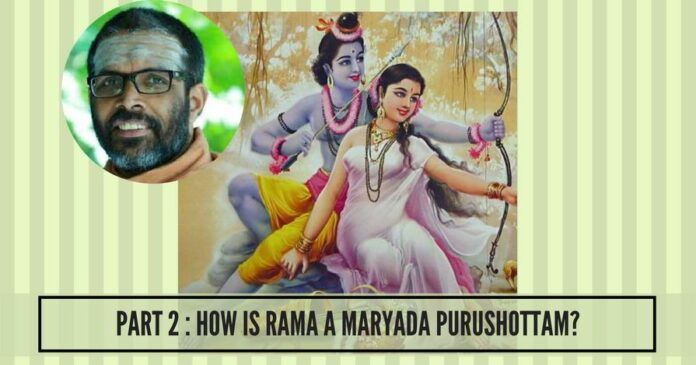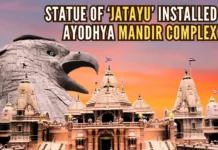
In previous part of this article the Swamiji explains, why whatever Rama does is Dharma. In this part, the Swamiji further explains the two incidents from the Ramayana which many people find hard to accept.
Now, coming to the subject of dharma for kings, a raja or king is one who uses informers as his eyes and ears. He does not depend on his physical eyes and ears. Chanakya has made it very clear that a king is bound to rule his kingdom based on the inputs given by his various informers who move around the kingdom concealed or otherwise. These informers collect information about the state of his kingdom and relay to the king. Based on these inputs, the king is bound to adjust his ruling style.
During the time of yajnas, he used to have a golden murti of Sita made, to be seated next to him since yajnas require the husband and wife to be together for its conduct.
So, coming back to the story of Rama, his informer comes back to him with the following observation. He says that he overheard a conversation in Rama’s kingdom which went like this: “See, if you have gone and stayed with someone else just like that, you can’t expect that I will take you back. I am not Rama to do that”.
A king should not do wrong nor be accused of doing wrong. That was the law. The ethics and values of that time were not the same as those today where our politicians hang on to power and position no matter what wrongs they indulge in.
The ethics and laws of those days were that it didn’t matter if someone from other kingdom or enemy kingdoms talked ill of the king. However, even if one person from one’s own kingdom accused the king of any wrongdoing, the king was bound to take note and make corrections.
Now, in Rama’s case, after he had gotten this information from his informers, he had two options before him. He could choose to take his role as husband as the primary dharma or he could take his role as king as primary dharma. The two are in opposition. If he chose to act as the husband of Sita, then he had to relinquish his role as king and live happily with Sita as husband and wife. We may think that this is the right choice if we give credence to our emotions. However, if he were to give up the role of king, who was there to take it up? Would it have been Bharata? Bharata is the person who had sworn that if Rama did not come back to take his rightful place as king after 14 years of exile, he would enter the fire and immolate himself. He was a person who was prepared for this kind of a sacrifice.
Lakshmana and Shatrugna were not choices either. In that case, what would happen to the kingdom? It would be left headless and such a kingdom would soon be destroyed. In the ‘Dharmasastras‘ it has always been prophesied thus. In these circumstances, Rama could choose only one course of action to uphold dharma. He had to make his dharma as a husband secondary to his primary dharma as a king. He had to abandon Sita (in fact Sita had expressed earlier that she would like to go and live in the forest for a while, especially close to the ashrams of the great rishis who lived in the forests)and bowing down to his primary duty, he took action.
One has to carefully observe how Rama lived after that incident. At the time, Rama was only 39 years old. If he wanted to, he could have married again. A king is allowed to have multiple wives. His own father Dasharatha had 3 wives and 360 concubines. However, Rama as a patnivrata husband refused to give in to pressures and numerous temptations from various quarters that would naturally have been put on him, to get married again. During the time of yajnas, he used to have a golden murti of Sita made, to be seated next to him since yajnas require the husband and wife to be together for its conduct.
“The Ikshvaku dynasty has the command of all the kingdoms of this world. I have only given you the punishment you deserve.”
Is it to such a Rama we impute adharma? Moreover, in the Ramayana, it is clearly mentioned that after Sita’s banishment into the forest, Rama conducted his life as an ascetic. There are umpteen instances where Rama the husband has burst into copious tears whereas Rama the king is totally unmoved. In the public gathering in the palace at the time he has to make the decision to be either husband or king, he proclaims stone-faced that he is going to banish his wife and that if anyone were to protest even mildly, he would behead them. He repeated the same words to his brothers Bharata, Lakshmana and Shatrugna too. However, Rama the husband rushes into his chambers and breaks into uncontrollable tears. His brothers are seen to be consoling the weeping husband Rama.
One needs to read the Ramayana in its original to understand this difference. We need to think by placing ourselves in the shoes of a king and not as ourselves. We must also understand that a king is never free or independent. We think that life is easy and full of luxury for a king. But that is far from the truth. A king is one who is never free. Chanakya clearly says that a king is not a free man. Whatever rishis have transmitted to him through Neetisastras, he has rights only according to that. We, ordinary people, have a lot more freedom than a king.
Swamiji exhorts us to read the Valmiki Ramayana at least once to understand its depth and beauty. He says that it is best to read it in Sanskrit and if that is not possible, then to read any of the translations.
Questioner: Is it ethical for a person to attack somebody in stealth
Swamiji: No, never. It is never ethical to conduct warfare through devious means.
Questioner: Then what about the killing of Bali?
Swamiji: There was no battle between Rama and Bali. If there was a battle between Bali and Rama, then what Rama did would have been considered unethical. The battle or rather the wrestling match was between Bali and Sugreeva. It was when they were engaged in a tussle that Rama shot an arrow that caused Bali to fall to the ground.
It is imperative that we now do a character sketch of Bali. It is only then that we can understand the entire situation. Bali is a very strong person. He is not just strong but his nature is also such that he will accept only what he thinks is correct. He will not listen to anyone else. Unless he felt it was the right course, he would not agree to anything. This character of Bali has been clearly explained in the Valmiki Ramayana.
Rama shot an arrow and Bali collapsed to the ground. When this happened everyone rushed to his side. Rama, Lakshmana, Hanuman, Neela, Gavaya and others all rushed to his side and held him. Bali then exploded and said, “Rama, what did you do? The meat of Vanaras is not edible. Then why did you shoot at me? Why did you commit an adharmic act?” Rama replied, “The Ikshvaku dynasty has the command of all the kingdoms of this world. The famous Dandan is of this dynasty and I am the son of Dasharatha who is his descendant. I have only given you the punishment you deserve as a king of any kingdom would give to his subject for a similar crime.”
Bali put this chain on Sugreeva’s neck to atone for all the wrongs he had committed against his brother.
What was Bali’s crime? While his younger brother Sugreeva was alive, Bali had raped his wife and taken her for his own and was ruling as king. Rama says that he had only inflicted that punishment on Bali that any king would for such a crime as Bali had committed.
On hearing this, the normally tempestuous Bali suddenly became transformed. He said, “Rama, please remove the arrow from me. It is hurting me”. This is a very intense scene in the Ramayana; Rama removes the arrow from his body and starts to gently caress him. There is a chain in Bali’s neck which he removes at this instant and puts on Sugreeva.
Here it is necessary to explain that it is because of this chain that Rama hid behind the tree and shot at Bali. As long as the chain was in Bali’s neck, anyone coming to fight Bali face to face would lose half their powers to him. Bali had this boon. Rama was not one to lose his powers for no reason. His powers were reserved for other bigger things in the future.
It is this chain that Bali puts on his brother Sugreeva who until that minute was his sworn arch enemy.
Bali could have easily asked Rama to put this chain in his son Angad’s neck. Isn’t that the way a father would normally behave? But that was not what Bali did. He put this chain on Sugreeva’s neck to atone for all the wrongs he had committed against his brother. This one act of his purified him like no other for he had passed on the advantage of being invincible to the very person who he had wronged terribly until that moment. He then requested Sugreeva to take care of his son Angad and wife Tara.
Thus, Swamiji explains the two incidents from the Ramayana which many people find hard to accept.
We request you to let us know through your comments if this explanation was useful to you in terms of clarifying some of your doubts.
Disclaimer: The write up is not a word to word translation and in fact, it is not even a minute to minute translation. There are some minutes of the audio which have not been translated as it does not add too much more to the explanation or is not directly relevant.
Source:
Note:
1. Text in Blue points to additional data on the topic.
- Elon Musk postpones India visit. Non-clarity in Tesla partner and Starlink license might be the reasons - April 20, 2024
- NIA confiscates Pak-harboured Khalistani terrorist Lakhbir Singh Rode’s key aide’s land in Moga - April 19, 2024
- Prime Minister Narendra Modi: A Gujju businessman who does not invest his precious time for a losing battle - April 13, 2024











Thanks for translating the story. I have started following Pgurus from past couple of days and I find it awesome. The Story is great indeed but the sad part is no one is following it. If we read it and follow its good things then I don’t think there can be ever wrong doings or adharma..!!
Thanks Pgurus for this article!
Excellent and very logical explanation by Swamiji as usual. As a person who ardently follows swamijis discourses it was a pleasure to see his words reflected in PGurus.com so that people outside kerala can also benefit from it. I would love to see PGurus interview Swamiji in the near future . Apart from his immense knowledge in spirituality he has very clear views about the current social and political scenario in kerala.
Jaya Sri Ram
I have a question here:
1. Bali considers himself as animal when he says their meat is not edible for Kshtriyas so they can’t be hunted. So, does same rules of wife and husband (of humans) apply to animals too? If they don’t then raping brother’s wife doesn’t arise?
2. Does Sugriva’s wife anywhere mention that she is had to be Bali’s wife unwillingly?
Thanks,
Ravi
It’s not good to see the intellect being wasted to defend and explain away the fake. Going round and round in circles.
If you think this story of abandonment is really part of Ramayana, then the debate will rage on and on. One part of us will always question the Maryada of Sri Rama in abandoning a pregnant Sitadevi in the forest. And that too based on hearsay. How can that be a maryada – more so for a just king?
If we are interested only in the truth, then the first step is to abandon the false the moment you see it. Uttara Khanda does not exist in Valmiki Ramayana.
The powers that be that ruled India for 800 years had the government, the money and the media to create, spread and establish false narratives. It is not easy to shake off 800 years. But if we pause to notice what our conscience has to tell us we will say – enough is enough.
Otherwise, with the governments, economy and the media in our hands, it is so easy to prove and establish that Reagan was born in Chennai and that his father’s name was Murugan.
Just search Google with the keywords “The Veto Power of Conscience Vadakayil” and once you read this post you will come out a wee bit more enlightened.
Capt Ajit Vadakayil has opened our eyes to our ancient culture and now our hearts and mind can find peace at the fact that all is not lost yet.
Good explanation! In the TV series Rama tells Vaali, now that he had received punishment the paapa has been accounted for , he can get up and rule. Vaali declines the offer saying he prefers death as he will get moksha because Ishwara has slayed him (they say many rakshashas killed by avataar get instant moksha).
In the Bhagvaat Purana at the end a hunter shoots an arrow at Krishna by mistake.He was profusely apologetic but Sri Krishna assured him it was the way he accepted to end his avataar and even gave him a darshan of Vishnu’s form before leaving his body. It is stated this hunter was Baali reborn to account for the karma he suffered at the hands of Sri Rama
I’m thankful to Pgurus to elaborating the texts, this is one of the best pieces to read.
Beautiful…
Too good…
Those days people remained good only because these things were taught every now n then to all villages in the form of plays.
British came n mocked at such epic plays n now we can see the plight of movies n their influence in real life.
Gang rapes, child murders, molestations, terrorism…
Oh my dear India , wish you could have remained without development but with good values.